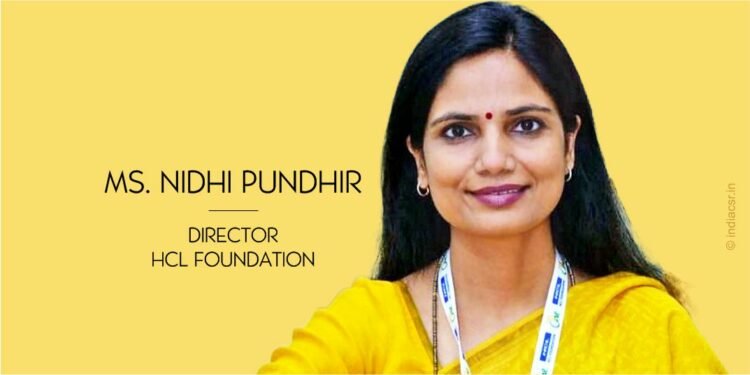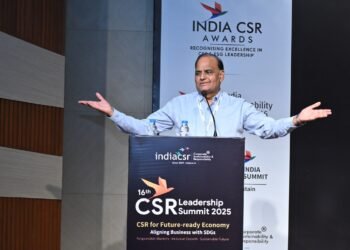For India CSR Leadership Series Nidhi Pundhir, Director-HCL Foundation shared insights of recent works and her views on various programmes of foundation. Excerpts of an interview:
What is your take on the increased usage and reliance on technology to implement CSR projects, especially in education and skill development, during COVID times?
Coronavirus has had a massive impact on economic conditions globally. Because of the critical circumstances, technological innovation became a vital source to support the work culture. Corporates began teaming up with different technology accomplices, especially in the education and skill development sector since employees started working remotely. With the rise of dynamic training technology, online courses across data sciences, cloud solutions, digital marketing turned out to be very popular.
EdTech companies are leveraging artificial intelligence and machine learning to deliver personalized training programs that adapt to learners’ existing skills and goals. Online training platforms are also leveraging best practices from leading institutions across the world to hone non-traditional skill sets. Many private companies have actively participated in digital skill development, which further strengthened India’s budding entrepreneurial ecosystem. Moreover, the government is also focusing on upgrading higher education to bring in greater skills.
HCL Foundation under HCL Uday has various projects on employable skill training, especially for the youth and women, to promote sustainable livelihood opportunities and create strong and self-reliant people and communities. We believe embedding digital skills in the early learning stage is critical to prepare our youth for the future.
To facilitate inclusive education and last-mile delivery of education and skilling services, we believe it will be necessary to address gaps, such as – Digital Literacy and Infrastructural Support is limited, Content exists, Usage and content consumption is not efficient, Language Barrier in the E-Content, Cost of Connectivity – Access, Lack of standardized e-content, The most vulnerable are getting left out – Gender & Inclusion and Dependence on parents and family for facilitating the learning process (most students are first-generation learners, parent motivation to be addressed.
Some areas that may be prioritized for funding in this regard, include low-cost multilingual platforms that could work on low bandwidth , Capacity Building of Teachers – Use of blended mode approach for science, Streamlining of the digital content delivery cycle, Contextualization & Standardization of content, Interactive E-Learning through innovative solutions, Digital Learning kits powered by alternate energy sources, Strengthening the digital infrastructure, Scaling up e-learning models that have demonstrated success and Setting up E-Hubs in communities.
What are the challenges that you have been facing while implementing your CSR programme during the COVID pandemic?
In the first quarter of the financial year 2020-21, the Covid-19 pandemic threw two primary challenges –restoration of the regular long-term programs through HCL Foundation to ensure that the gains made so far are not lost, thus all projects on the ground needed re-engineering such that communities are least impacted; and Relief, Response & Build Back during the COVID-19 pandemic and reach out to geographies even outside the regular program intervention areas.
During those difficult times, it was the commitment and resilience of our communities, teams and partners that helped us stay afloat and navigate through the situation – standing strong and keeping our efforts sustained.
While the program did face disruptions in the first quarter due to the lockdown, HCL Foundation was quick to re-strategize the programs and initiate action. Having a robust database helped us initiate quick telephonic surveys that helped us understand the needs of the communities and teams on the ground, continued reaching out and ensuring safety and well-being. We re-assessed priorities and were soon able to adapt to the ‘new normal’.
Foundation’s response to COVID-19 included immediate relief, restoration and ‘build back’ efforts. It extended support to the state governments in their efforts to contain the spread of the disease as well as to help the marginalized communities. A holistic strategy was devised, which included support across the categories of training, capacity building, awareness & coordination support through the use of technology tools and platforms; complementing the healthcare services; personal protective equipment (PPE) for health care workers and frontline workers; food security; care for elderly, children & most disadvantaged and animal welfare.
We launched a ‘Call for Action’ initiative towards COVID-19 by collaborating with its NGO partners to respond, increase resilience as well as reduce vulnerabilities of local communities, enabling them to better prepare for, mitigate and respond to the pandemic.
In response to the ‘Call for Action’, 24 partnerships were forged extending support across 15 states of India. This was over and above the existing partnerships with the NGOs and communities and the response and action initiated in collaboration with them under the existing HCL Foundation programs.
How are you bracing with the new normal, as you continue taking your CSR activities ahead adhering to the COVID protocols?
We are following all the necessary safety guidelines laid by the Government of India and are maintaining proper social distancing. Our on-ground team members are always wearing masks while carrying out activities and are also educating communities about safety awareness programs like the importance of sanitization and hygiene methods to improve health immunity to strengthen the fight against Covid-19.
What also helped us respond, continue and sustain our efforts during these times was the engagement with communities through which we were able to establish a network of community volunteers and mobilisers who helped us ensure action on the ground. All our efforts are aimed at centre-staging the people, enabling them and walking by their side – on their journey of change. And during these difficult times, it was extremely heartening to see our investment in resilience building and community ownership paying off.
For COVID19 response, we put together a coordinated strategy and resource at the group level, over and above its commitments through Foundation. Through HCL’s coordinated COVID19 Response, led by HCL’s apex leadership, we supported technology-enabled COVID19 Command Centres in Tamil Nadu, Uttar Pradesh & Karnataka. Worked closely with U.P and T.N Government to support the healthcare needs. Worked towards food security and animal care needs. While doing so, none of our regular development work was disturbed, since we understand the importance of maintaining continuity in resilience building of communities.
As activities in the virtual world and digital platforms seem to the new normal, do you see this as a practical and long-term solution?
The world is currently focused on the ongoing Covid crisis. Although people are trying to return to normalcy, online has become an emerging trend. But there are certain advantages and disadvantages of online activities vis-à-vis on-ground activities.
Strengths of online activities: Firstly, online activities offer flexibility. One can participate from anywhere in the world as long as they have a computer or a smart gadget and internet access. Moreover, one can record lectures, calls or any other activity happening online and can listen to it any time suitable to their routine sitting in the comfort of their homes.
Secondly, all the materials are always available online for the participants. They can access the materials as many times as required and can take as long as they require understanding certain concepts without being time-bound by official hours. This helps participants work at their own speed without fear of missing out.
Thirdly, the online set up provides a productive communication between the participants and organizers and a constant synergy is shared throughout the learning process. All participants can add to the ongoing conversation and can present their opinions without hesitation and time limitations.
Advantages of On-ground Activities: On-ground activities promote collaborative learning, which increases participants’ awareness of others and help them develop adaptability easily and effectively
On-ground activities also enhance critical thinking skills. These activities engage learners in live discussions which help them formulate opinions or arguments.
Most importantly, on-ground activities improve the social skills of people as they interact with their peers and colleagues to establish a rapport. Physical presence helps participants retain more from what they have learned during the session.
Physical activities improve the organizational skills of an individual. They help individuals to organize their time, prioritize their assignments and arranging their schedules accordingly.
Disadvantages of Online Participation: Online participation is limited to the use and availability of technology. Even the most advanced technology is not 100% secure and can be subjected to piracy. Moreover, in India, a huge percentage of the population cannot afford smart gadgets, which makes it impossible for them to keep pace with others.
Online mode of participation also provides an improper learning environment for -younger learners as they need to garner a high degree of time management abilities and be always self-motivated
Lastly, successful on-ground activity does not always translate into successful online programs. The facilitators need to be adequately qualified according to the online methodologies to successfully retain the attention of the participants. An online program will be undermined if the facilitator is not well versed with the latest technology. HCL Foundation has also been working towards building capacities in this regard.
What is the way ahead for corporates for building a strong CSR environment in the days to come?
In the current situation, we advise corporate colleagues to identify the problems that require immediate attention and will be beneficial to larger sections of society. The entities should align their strategies basis their research and knowledge of a specific issue which can be a win for community partners and the corporate.
Alongside addressing socio-economic concerns, it is also important, especially in these times, to pay attention to environmental concerns and focus on ecosystem conservation and sustainable practices.
One should carefully access the ROIs of the CSR efforts to understand the bottom line experience of the beneficiaries. CSR programs have the potential to bring value to the business as well as society if done in an organized manner. By aligning corporate citizenship efforts with revenue-generating activities, we can ensure that our CSR programs are strategic and sustainable.
(CopyRight@IndiaCSRNetwork)






















